Ernst Lubitsch's spectacular costume drama Madame DuBarry (1919) is an operatic version of the life, loves and death of the legendary 18th-century French courtesan. Pola Negri plays DuBarry, who sleeps her way from a worker in a Paris hat shop to to the court of King Louis XV, ultimately becoming his mistress. A cast-of-thousands spectacle, it got both its star and its director noticed by Hollywood.
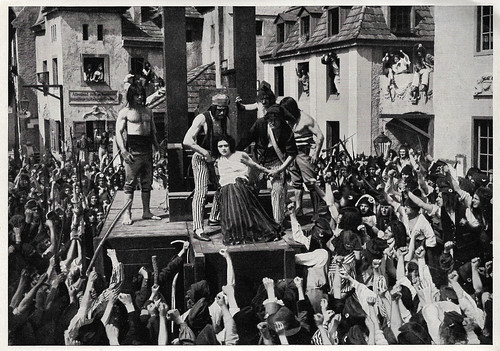
German collectors card by Ross Verlag in the series Vom Werden deutscher Filmkunst - Der Stumme Film, picture no. 67, group 40. Photo: Ufa. Publicity still for Madame Dubarry (Ernst Lubitsch, 1919). Caption: Pola Negri as Madame Dubarry, execution on the market square in Paris.
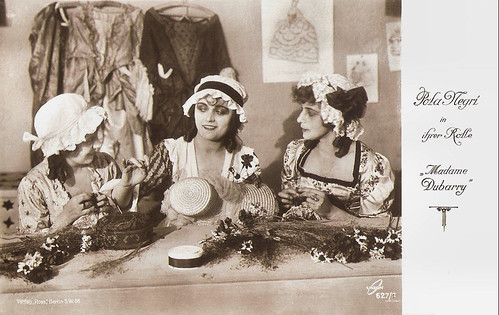
German postcard by Ross Verlag, no. 627/1. Photo: Union. Pola Negri in Madame Dubarry (Ernst Lubitsch, 1918).

German postcard by Ross Verlag, Berlin, no. 627/2, 1919-1924. Photo: Union. Publicity still for Madame DuBarry (Ernst Lubitsch, 1919) with Pola Negri and Harry Liedtke.
Ernst Lubitsch's Madame Dubarry is a historical epic which opened as the premiere attraction of Berlin's impressive Zoopalast theatre on in 1919.
Writers Norbert Falk and Hanns Kraly tell the infamous story of Jeanne Becu, her rise to power's easily-swayed side, and in the end her ultimate fate at the hands of the Reign of Terror.
Pola Negri plays the milliner’s apprentice (in the film named Jeanne Marie Vaubernier), who has come to Paris from the country. Harry Liedtke plays her first love, Armand De Foix.
In a deal to save her next lover, Count DuBarry (Karl Platen), from financial ruin, the Parisian milliner's maid alias Madame DuBarry (Pola Negri) becomes the influential mistress of the reigning French king, Louis XV (Emil Jannings).
However, this relation is much to the dismay of the Minister of State and Finance, Choiseul (Reinhard Schünzel). This brilliant schemer had planned for his sister, the Duchesse de Grammont, to become the Queen of France. Choiseul thus starts a campaign to turn the people against the monarch and his new mistress.
Jeanne soon becomes a symbol for the extravagance of the much-hated aristocracy. When the king dies, Jeanne is ousted by the angry masses and she becomes one of the victims of the Reign of Terror during the French Revolution.
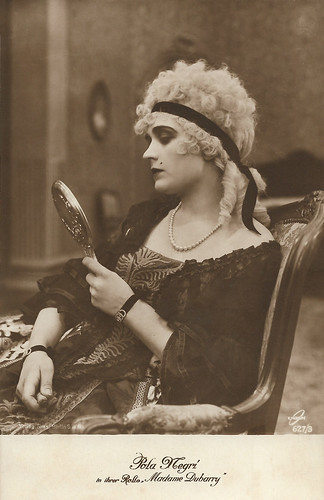
German postcard by Ross Verlag, no. 627/3. Photo: Union. Pola Negri in Madame Dubarry (Ernst Lubitsch, 1918).
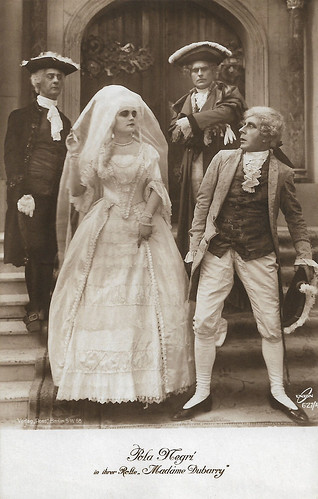
German postcard by Ross Verlag, no. 627/4. Photo: Union Film. Pola Negri in Madame DuBarry (Ernst Lubitsch, 1919). By marrying the aristocrat Guillaume DuBarry (Karl Platen), Jeanne will be accepted at the Royal Court and become Louis XV's mistress. Back right on this card DuBarry's brother Jean (Eduard von Winterstein) who concocted the plan.

German postcard by Ross Verlag, no. 627/5. Photo: Union Film. Pola Negri in Madame DuBarry (Ernst Lubitsch, 1919).
Madame DuBarry (1919) had everything: sex, intrigue, war, violence. Shot in part at Frederick the Great’s Sans Souci palace in Potsdam and part in the mammoth film studio of the Ufa formed in 1917, Madame Dubarry displays all the delights of French life at Versailles.
The film was a success in both Europe (except in France) and the U.S., where it was released as Passion, and successfully re-issued in 1928. It was one of the greatest triumphs of Pola Negri.
Negri's flirtatious Madame DuBarry is both comical and sympathetic. Emil Jannings is also excellent as a lecherous, bombastic King Louis XV. Harry Liedtke plays Jeanne's first love, the student Armand de Foix.
Madame DuBarry (1919) was directed by Ernst Lubitsch, written by Norbert Falk and Hanns Kräly. It strays far from historical accuracy, but the narrative is at least coherent.
In reality, King Louis XV died 15 years before the beginning of the French Revolution and Madame DuBarry was long gone from Versailles by the time of the storming of the Bastille. She was 50 when she was executed during the Reign of Terror.
Despite these flaws, Chuck Reilly reviews at IMDb, "the gigantic mob scenes and the final shots of poor Pola being carted off to the guillotine are well-staged and resonate even with modern viewers".
Shari Kizirian at Senses of Cinema: "From the first frame, Pola Negri charms us as Jeanne. Delightfully mischievous, she has a girlish way of getting what she wants. First, seeking someone to tote the hat she is delivering, she catches a stranger’s eye. Cut, and she’s leading him with her parcel in tow toward her true destination, her boyfriend’s place. Next, Sunday lunch with an aristocrat. She chooses the don over her commoner boyfriend, by counting, and then quickly recounting, the ribbons on her dress. Her ultimate prize? A pedicure from a king. When she commands the smitten Louis to sit back down, keeping him from the business of the realm, she exercises exceptional power for a grisette."

German postcard by Ross Verlag, no. 627/6. Photo: Union Film. Publicity still of Reinhold Schünzel and Pola Negri in Madame DuBarry (Ernst Lubitsch, 1919). After the death of king Louis XV (Emil Jannings), his minister Choiseul (Schünzel) chases DuBarry (Negri) from the Royal palace.
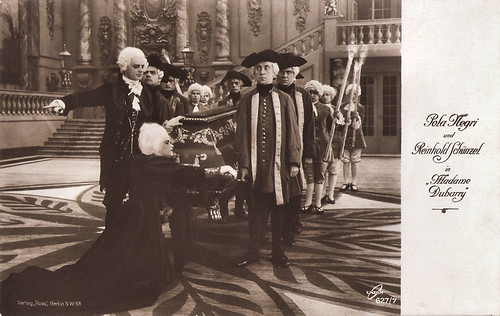
German postcard by Ross Verlag, Berlin, no. 627/7. Photo: Union Film. Publicity still of Reinhold Schünzel and Pola Negri in Madame DuBarry (Ernst Lubitsch, 1919).
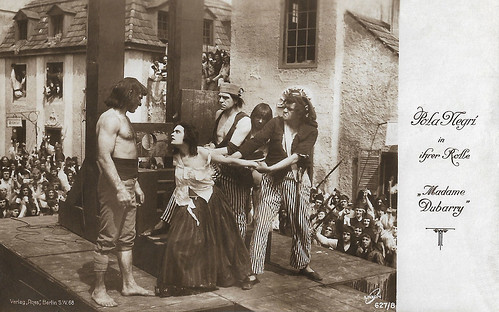
German postcard by Ross Verlag, no. 627/8. Photo: Union. Pola Negri in Madame Dubarry (Ernst Lubitsch, 1918).
Sources: Shari Kizirian (Senses of Cinema), Hal Erickson (AllMovie), Chuck Reilly (IMDb), Filmportal.de, Wikipedia and IMDb.

German collectors card by Ross Verlag in the series Vom Werden deutscher Filmkunst - Der Stumme Film, picture no. 67, group 40. Photo: Ufa. Publicity still for Madame Dubarry (Ernst Lubitsch, 1919). Caption: Pola Negri as Madame Dubarry, execution on the market square in Paris.

German postcard by Ross Verlag, no. 627/1. Photo: Union. Pola Negri in Madame Dubarry (Ernst Lubitsch, 1918).

German postcard by Ross Verlag, Berlin, no. 627/2, 1919-1924. Photo: Union. Publicity still for Madame DuBarry (Ernst Lubitsch, 1919) with Pola Negri and Harry Liedtke.
Victim of the Reign of Terror
Ernst Lubitsch's Madame Dubarry is a historical epic which opened as the premiere attraction of Berlin's impressive Zoopalast theatre on in 1919.
Writers Norbert Falk and Hanns Kraly tell the infamous story of Jeanne Becu, her rise to power's easily-swayed side, and in the end her ultimate fate at the hands of the Reign of Terror.
Pola Negri plays the milliner’s apprentice (in the film named Jeanne Marie Vaubernier), who has come to Paris from the country. Harry Liedtke plays her first love, Armand De Foix.
In a deal to save her next lover, Count DuBarry (Karl Platen), from financial ruin, the Parisian milliner's maid alias Madame DuBarry (Pola Negri) becomes the influential mistress of the reigning French king, Louis XV (Emil Jannings).
However, this relation is much to the dismay of the Minister of State and Finance, Choiseul (Reinhard Schünzel). This brilliant schemer had planned for his sister, the Duchesse de Grammont, to become the Queen of France. Choiseul thus starts a campaign to turn the people against the monarch and his new mistress.
Jeanne soon becomes a symbol for the extravagance of the much-hated aristocracy. When the king dies, Jeanne is ousted by the angry masses and she becomes one of the victims of the Reign of Terror during the French Revolution.

German postcard by Ross Verlag, no. 627/3. Photo: Union. Pola Negri in Madame Dubarry (Ernst Lubitsch, 1918).

German postcard by Ross Verlag, no. 627/4. Photo: Union Film. Pola Negri in Madame DuBarry (Ernst Lubitsch, 1919). By marrying the aristocrat Guillaume DuBarry (Karl Platen), Jeanne will be accepted at the Royal Court and become Louis XV's mistress. Back right on this card DuBarry's brother Jean (Eduard von Winterstein) who concocted the plan.

German postcard by Ross Verlag, no. 627/5. Photo: Union Film. Pola Negri in Madame DuBarry (Ernst Lubitsch, 1919).
Far from historical accuracy
Madame DuBarry (1919) had everything: sex, intrigue, war, violence. Shot in part at Frederick the Great’s Sans Souci palace in Potsdam and part in the mammoth film studio of the Ufa formed in 1917, Madame Dubarry displays all the delights of French life at Versailles.
The film was a success in both Europe (except in France) and the U.S., where it was released as Passion, and successfully re-issued in 1928. It was one of the greatest triumphs of Pola Negri.
Negri's flirtatious Madame DuBarry is both comical and sympathetic. Emil Jannings is also excellent as a lecherous, bombastic King Louis XV. Harry Liedtke plays Jeanne's first love, the student Armand de Foix.
Madame DuBarry (1919) was directed by Ernst Lubitsch, written by Norbert Falk and Hanns Kräly. It strays far from historical accuracy, but the narrative is at least coherent.
In reality, King Louis XV died 15 years before the beginning of the French Revolution and Madame DuBarry was long gone from Versailles by the time of the storming of the Bastille. She was 50 when she was executed during the Reign of Terror.
Despite these flaws, Chuck Reilly reviews at IMDb, "the gigantic mob scenes and the final shots of poor Pola being carted off to the guillotine are well-staged and resonate even with modern viewers".
Shari Kizirian at Senses of Cinema: "From the first frame, Pola Negri charms us as Jeanne. Delightfully mischievous, she has a girlish way of getting what she wants. First, seeking someone to tote the hat she is delivering, she catches a stranger’s eye. Cut, and she’s leading him with her parcel in tow toward her true destination, her boyfriend’s place. Next, Sunday lunch with an aristocrat. She chooses the don over her commoner boyfriend, by counting, and then quickly recounting, the ribbons on her dress. Her ultimate prize? A pedicure from a king. When she commands the smitten Louis to sit back down, keeping him from the business of the realm, she exercises exceptional power for a grisette."

German postcard by Ross Verlag, no. 627/6. Photo: Union Film. Publicity still of Reinhold Schünzel and Pola Negri in Madame DuBarry (Ernst Lubitsch, 1919). After the death of king Louis XV (Emil Jannings), his minister Choiseul (Schünzel) chases DuBarry (Negri) from the Royal palace.

German postcard by Ross Verlag, Berlin, no. 627/7. Photo: Union Film. Publicity still of Reinhold Schünzel and Pola Negri in Madame DuBarry (Ernst Lubitsch, 1919).

German postcard by Ross Verlag, no. 627/8. Photo: Union. Pola Negri in Madame Dubarry (Ernst Lubitsch, 1918).
Sources: Shari Kizirian (Senses of Cinema), Hal Erickson (AllMovie), Chuck Reilly (IMDb), Filmportal.de, Wikipedia and IMDb.
No comments:
Post a Comment